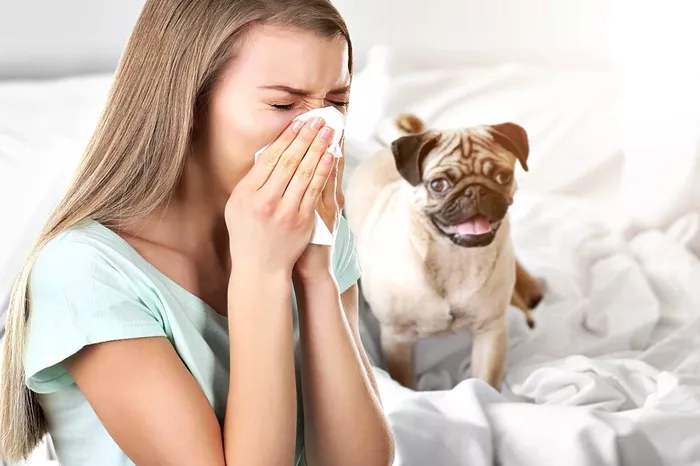Dog allergies stem from an immune response to proteins found in dog dander, saliva, and urine. When exposed to these allergens, susceptible individuals may experience a range of symptoms, including sneezing, coughing, wheezing, nasal congestion, itchy eyes, and skin rashes. The question may rise: Can dog allergies go away with exposure? Understanding the underlying mechanisms of dog allergies is essential for effective management and relief.
Desensitization and Immunotherapy: Building Tolerance Over Time
Concept of Desensitization: Desensitization involves gradually exposing an individual to increasing amounts of an allergen to build tolerance over time. This process aims to retrain the immune system’s response to the allergen, reducing the severity of allergic reactions.
Immunotherapy as a Treatment Option: Allergen immunotherapy, commonly known as allergy shots, is a medically supervised form of desensitization that can be effective for some individuals with dog allergies. By administering small doses of dog allergens under controlled conditions, immunotherapy helps desensitize the immune system and alleviate allergic symptoms over time.
Limitations of Exposure Alone: Relying solely on exposure to overcome dog allergies is not a reliable or recommended approach. Exposing oneself to high levels of allergens without proper supervision can lead to worsening symptoms or even severe allergic reactions. Immunotherapy should be conducted under the guidance of a qualified healthcare professional.
Managing Dog Allergies: Strategies for Relief
Minimizing Exposure: Practical tips for reducing exposure to dog allergens at home include using air purifiers with HEPA filters, establishing dog-free zones in the house, regularly washing bedding and soft furnishings, and vacuuming with a HEPA filter vacuum cleaner.
Medications: Over-the-counter and prescription medications can help alleviate allergy symptoms. Antihistamines, decongestants, nasal corticosteroids, and allergy eye drops are commonly used to manage symptoms such as sneezing, itching, and congestion.
Lifestyle Modifications: Adopting a healthy lifestyle can complement allergy management efforts. Stress management techniques, such as meditation, yoga, or exercise, can help reduce the body’s overall reactivity to allergens. A balanced diet rich in fruits, vegetables, and omega-3 fatty acids may also support immune function and reduce inflammation.
Alternative Breeds: While no dog breed is entirely hypoallergenic, some breeds produce fewer allergens than others. Breeds such as poodles, bichon frises, and Portuguese water dogs are often considered more suitable for individuals with allergies. However, it’s essential to note that individual sensitivity may vary, and allergies can still occur with these breeds.
Seeking Professional Guidance: The Importance of Allergy Testing and Medical Advice
Importance of Allergy Testing: Seeking allergy testing from a qualified allergist is crucial for confirming dog allergy and identifying other potential allergens that may be contributing to symptoms. Skin prick tests or blood tests can help pinpoint specific allergens and guide treatment decisions.
Consulting a Doctor or Allergist: Individuals with dog allergies should consult a healthcare professional, such as a primary care physician or allergist, for personalized management and treatment plans. A healthcare provider can offer guidance on allergy avoidance strategies, medication options, and the potential benefits of allergen immunotherapy.
Conclusion: Navigating the Journey to Allergy Relief
While exposure to dog allergens may play a role in desensitizing the immune system over time, it is not a standalone solution for managing dog allergies. A comprehensive approach that includes allergen avoidance strategies, medication management, lifestyle modifications, and, in some cases, allergen immunotherapy, is essential for effective symptom control and improved quality of life. By seeking professional guidance and adopting proactive allergy management strategies, individuals with dog allergies can find relief and enjoy the companionship of their furry friends with greater comfort and confidence.
FAQs:
1. Can you build immunity to dog allergies?
While some individuals may experience a reduction in allergy symptoms over time with regular exposure to dogs, true immunity to dog allergies is rare. Exposure may lead to desensitization for some, but it’s not guaranteed and can vary greatly between individuals. Allergy shots, or allergen immunotherapy, under medical supervision, offer a more reliable method to build tolerance to dog allergens by gradually exposing the immune system to increasing doses of the allergen.
2. How long does it take for dog food allergies to clear up?
The time it takes for dog food allergies to clear up varies widely among individuals and depends on several factors, including the severity of the allergy, the specific allergen, and the effectiveness of dietary changes. In some cases, symptoms may improve within a few weeks of eliminating the allergen from the dog’s diet. However, it may take several months for inflammation to subside completely and for symptoms to resolve. Close monitoring and working with a veterinarian to identify and manage food allergies are essential for successful resolution.
3. Can a child overcome dog allergies?
While some children may outgrow their dog allergies, it’s not guaranteed, and individual responses vary. With careful management, including allergen avoidance strategies, medications, and potentially allergen immunotherapy, some children may experience a reduction in symptoms over time. However, it’s essential to consult with a pediatrician or allergist to develop a personalized treatment plan tailored to the child’s specific allergy triggers and medical history. Early intervention and proactive management can help improve the child’s quality of life and potentially lessen the impact of dog allergies over time.
[inline_related_posts title=”You Might Be Interested In” title_align=”left” style=”list” number=”6″ align=”none” ids=”6835,6832,6772″ by=”categories” orderby=”rand” order=”DESC” hide_thumb=”no” thumb_right=”no” views=”no” date=”yes” grid_columns=”2″ post_type=”” tax=””]
































